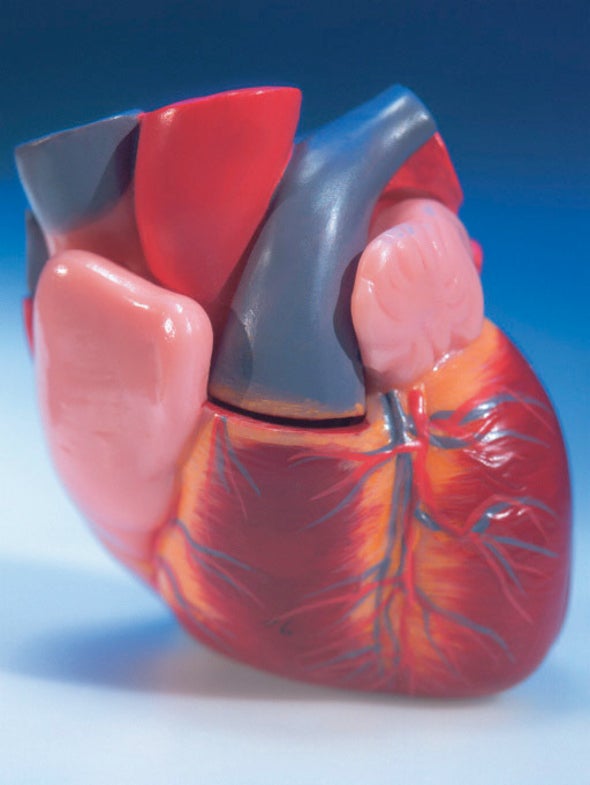(单词翻译:单击)
听力文本
This is Scientific American's 60-second Science, I'm Christopher Intagliata.
It sounds like a witches' recipe: gather the hearts of a fence lizard; a little brown bat; a naked-tailed armadillo; and dozens of others. "So initially we tried to get them from zoos... but unfortunately that didn't work out very well. We couldn't get any samples, even when the animal died, we couldn't get a heart."
Guo Huang, a developmental biologist at the University of California, San Francisco. He says they had more success obtaining specimens from the jars of natural history museums. The reason for this biological scavenger hunt? Huang and his colleagues wanted to examine the number of chromosomes contained in heart cells across the animal kingdom. Because there's a curious phenomenon in our hearts—which is that most of the human body's cells are diploid, meaning two sets of chromosomes, one from each parent. But the lion's share of our heart cells are actually polyploid, meaning two or more copies from mom, two or more copies from dad.
What Huang and his team found, looking at that collection of hearts, is that the proportion of polyploid cells in a heart goes up as you go from fish to lizards to amphibians to transitional species like platypuses, to mammals. The reason that finding might matter to us, is that recent studies in mice and zebrafish have shown that hearts with more diploid cells—like a zebrafish's—are able to regenerate and heal themselves. Hearts with more polyploid cells—like mice and humans—cannot.

So what makes a heart have more polyploid cells, and thus, less chance of regenerating? "That's actually the million-dollar question." But one answer Huang's team found, is that thyroid hormone—the same hormone that regulates metabolism and makes us warm-blooded creatures—might be to blame. Because when they added extra thyroid hormone to zebrafish's tanks, their tiny hearts were no longer able to regenerate. And, conversely, when they engineered mice to have hearts that were insensitive to thyroid hormone, the mouse hearts could regenerate back after injury.
"When we look at the heart function which is mainly measured by contract ability of the heart, we can see heart function improve over time after injury, while control mice cannot improve."
The results are in the journal Science.
As for fixing human hearts? Perhaps manipulating thyroid hormone levels could be a start. "We know regulating thyroid hormone probably alone is not sufficient to cure heart disease, at least for promoting heart regeneration completely. If we can figure out other major regulators of this process, we might be in a better shape."
Thanks for listening for Scientific American — 60-Second Science. I'm Christopher Intagliata.
参考译文
这里是科学美国人——60秒科学系列,我是克里斯托弗·因塔格里塔。
收集篱蜥、小棕蝠、裸尾犰狳和几十种其它动物的心脏——这听起来像是女巫的药方。“因此,一开始我们曾试图从动物园得到这些心脏样本……但不幸的是这不太可行。我们无法得到任何样本,即使动物死亡,我们也拿不到心脏。”
加州大学旧金山分校的发育生物学家黄果说到。他表示,他们从自然历史博物馆的罐子里成功获得了标本。为何要进行这种生物寻宝游戏?黄果及其同事想检查整个动物界心脏细胞中的染色体数量。因为我们的心脏有种奇怪现象——人体细胞大多是二倍体细胞,即人体内有两套分别来自父母的染色体。但我们心脏细胞的大部分是多倍体,也就是说从父亲或母亲处遗传到两套或两套以上的染色体。
黄果及其团队通过观察这些心脏发现,从鱼类到蜥蜴、两栖动物、鸭嘴兽等过渡物种,直至哺乳动物,心脏中多倍体细胞的比例逐渐增加。这一发现或许对我们很重要的原因是,最近对老鼠和斑马鱼进行的研究表明,像斑马鱼等拥有更多二倍体心脏细胞的动物,其心脏能再生和自我治愈。而像老鼠和人类等拥有更多多倍体细胞的心脏,则不能再生和自愈。
为什么心脏拥有更多多倍体细胞,再生的几率反而减少了呢?“这真是一个价值连城的问题。”但黄果的团队发现的一个原因是:甲状腺激素可能是罪魁祸首,甲状腺激素是调节新陈代谢、使我们成为恒温动物的激素。因为当他们向斑马鱼鱼缸中加入额外的甲状腺激素时,斑马鱼的小心脏便不能再生了。相反,当他们改变老鼠的基因,使其心脏对甲状腺激素不敏感时,老鼠的心脏便可以受伤后再生。
“当我们观察由心脏的收缩能力来衡量的心脏功能时,我们发现心脏功能在受伤后会随着时间的推移而改善,但对照组老鼠的心脏功能却没有改善。”
这项研究结果发表在《科学》期刊上。
那人类心脏能修复吗?也许可以从控制甲状腺激素水平开始。“我们知道,仅仅控制甲状腺激素可能不足以治愈心脏疾病,至少不能完全促进心脏再生。如果我们能找出这一过程的其他主要因素,那我们的身体状况可能会更好。”
谢谢大家收听科学美国人——60秒科学。我是克里斯托弗·因塔利亚塔。
译文为可可英语翻译,未经授权请勿转载!
重点讲解
重点讲解:
1. work out (如期)发生;进展(顺利);
Things just didn't work out as planned.
事情根本没有按计划进行。
2. the lion's share of sth. 最大(或最好)的一份;
Military and nuclear research have received the lion's share of public funding.
大部分公共资金都为军事与核研究所占。
3. go up (价格、数量或水平)上涨,上升;
Prices have gone up 61 percent since deregulation.
价格自解除管制以来已经上涨了61%。
4. be insensitive to 不敏感的;感觉迟钝的;
In economic terms, addicts'cravings are inelastic – they are relatively insensitive to cost.
上瘾群体对烟草的渴望是不能适应一些经济条款的,因为他们对花费相对不敏感。


